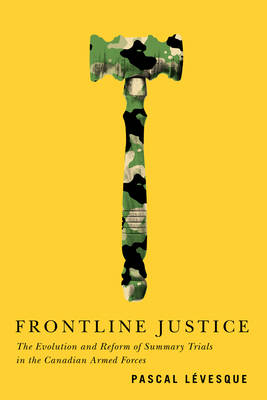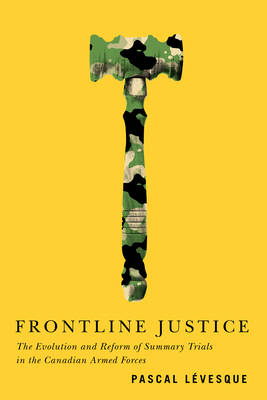
- Afhalen na 1 uur in een winkel met voorraad
- Gratis thuislevering in België vanaf € 30
- Ruim aanbod met 7 miljoen producten
- Afhalen na 1 uur in een winkel met voorraad
- Gratis thuislevering in België vanaf € 30
- Ruim aanbod met 7 miljoen producten
Zoeken
Frontline Justice
The Evolution and Reform of Summary Trials in the Canadian Armed Forces Volume 7
Pascal Lévesque
€ 55,45
+ 110 punten
Omschrijving
Compared with its civilian counterpart - which struggles with delays and uncertain results - summary military justice is efficient. From offence until outcome, 90 per cent of cases are dealt with in less than ninety days. The other side of the coin is that there is no right to representation by defence counsel, no transcript produced, and no appeal to a judge. Nine times out of ten, individuals are found guilty. For service members, consequences can include fines, reductions in rank, confinement, and sentences of up to thirty days in military jail, sometimes with a criminal conviction. Addressing important gaps in legal literature, Frontline Justice sets out to examine summary justice in Canada's military and to advocate for reform. Pascal Lévesque describes the origins, purposes, and features of the summary trial system in the Canadian Armed Forces. He then analyzes the system's benefits and flaws and the challenges it faces in maintaining discipline while respecting the Canadian Charter of Rights and Freedoms. Lévesque determines that troubling aspects of the system, including the fact that lower and higher ranks are dealt with and punished differently, are clear indicators of a need for change. Criticizing current legislation, the book takes into account the latest developments in military law and jurisprudence to make concrete recommendations for an alternative model of military justice. A thought-provoking and balanced analysis, Frontline Justice seeks to remedy some of the more unfair and arcane proceedings of the Canadian military's summary trial system.
Specificaties
Betrokkenen
- Auteur(s):
- Uitgeverij:
Inhoud
- Aantal bladzijden:
- 248
- Taal:
- Engels
- Reeks:
Eigenschappen
- Productcode (EAN):
- 9780773559301
- Verschijningsdatum:
- 19/03/2020
- Uitvoering:
- Paperback
- Formaat:
- Trade paperback (VS)
- Afmetingen:
- 150 mm x 226 mm
- Gewicht:
- 458 g

Alleen bij Standaard Boekhandel
+ 110 punten op je klantenkaart van Standaard Boekhandel
Beoordelingen
We publiceren alleen reviews die voldoen aan de voorwaarden voor reviews. Bekijk onze voorwaarden voor reviews.








